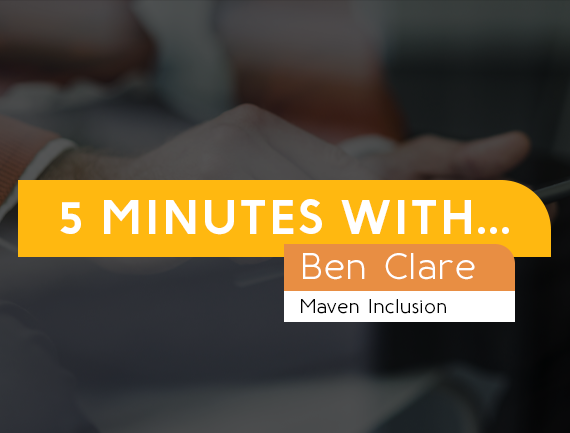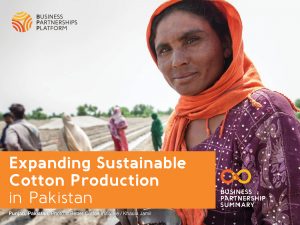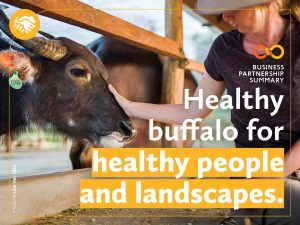Blog: Accessibility is good business … 5 minutes with Ben Clare from Maven Inclusion

Maven is an Australia-based disability and inclusion consulting service, working to break down barriers while increasing employment opportunities for people with disability. Maven supports businesses to identify and remove constraints to accessibility and inclusion.
Maven recently developed a training series for BPP partners on disability, with a focus on digital accessibility, and Ben Clare – a ‘Maven’ from Maven (the name comes from a Yiddish word for ‘expert,’ and Maven staff cover a whole spectrum of disability experience and knowledge) – took some time out to answer the BPP’s questions on how organisations can incorporate inclusion and accessibility into their business practices.
In the discussion, Ben is emphatic about why it is important that businesses prioritize inclusion. “There are so many reasons,” he explains. “Approximately 15% of the world’s population have lived experience with disability, and up to 20% of people in Australia have some form of disability… So that’s a huge market.”
But, for many businesses and their owners, the motivations are not just financial. “I think on a moral level, and this is something that a lot of businesses are now really getting into, it’s the right thing,” says Ben. “It’s right to be inclusive of everyone. Not only does it feel right, but what comes out of it, the consequences of inclusion, are really actually quite amazing.”
For business owners and managers looking to make their businesses more inclusive, Ben points to three main things that can be achieved relatively quickly and easily.
The first is to perform and access and inclusion check, of business premises, products, and online presence, to make sure they are accessible to everyone. He points to things like checking for accessible toilets, distance from public transport, and running an accessibility checker over your website.
Secondly, once they are taking active steps towards improving their accessibility, business owners can promote that they are inclusive, and walk-the-talk on this by implementing Ben’s third suggestion – being open to employing people with disability and taking any necessary steps to make that possible.
Maven’s ‘mavens’ cover a whole spectrum of disability experience and knowledge, and support businesses to put suggestions like Ben’s ‘top 3’ into action – from accessibility and inclusion training to accessible website development, developing institutional access and inclusion plans, support for organizations to hire and integrate employees with disability, and practical things such as easy-read document development. More information about Maven can be found at their website.
—–
TRANSCRIPT
Question: How does Maven define inclusion?
Ben Clare: So when we talk about inclusion, we work on what’s called the Human Rights model of disability. So the idea is that disability is not a barrier to inclusion and that the only barrier is society, society’s thoughts and understanding of disability.
We have other models. So we often sometimes look at the medical model which is a diagnosis that needs to be treated. We also have a charity model, which means people with disability are a charity case and need to be looked after.
We really focus as Maven on this idea that people with disability are just as able to do things as anybody else. And the only thing that’s really preventing that inclusion is attitudinal and society barriers. So we really work closely to really break down those barriers through education of people with disabilities, not people with disabilities, but people that we work with, both with lived experience and also organizations, to ensure that attitudinal barriers don’t get in the way of inclusion.
Question: Why should businesses prioritise inclusion?
Ben Clare: There are so many reasons for this, so I’ll just cover a couple. First thing to remember, and this is an estimation, but it’s quite an estimation that is used and accepted around the world. So approximately 15% of the world’s population have lived experience with disability. So essentially they have a disability. And up to 20% of people in Australia have some sort of disability.
So that’s, from a marketing point of view, there’s a huge market that if you’re not inclusive – and that can range from your building not being accessible through to your website and your products not being accessible – you’re actually missing out on a huge market. So from a financial point, that’s a quite an easy point to make. If you are even more inclusive in that area you know, you stand to gain more business.
I think, too though, on a moral level, and this is something that a lot of businesses are now really getting into, it’s the right thing. It’s right to be inclusive of everyone. It not only does it feel right, but what comes out of it, the consequences of inclusion, are really actually quite amazing.
This can range from the employment of people with disability. People with disability in general are very good workers, very loyal workers. They don’t necessarily take lots of time off, they’re very productive, so you’ve got that side of it, but you’ve also got this idea that you are contributing to a positive society, a society that enables anyone to participate regardless of disability.
And this is this really goes for other minorities as well, I think. And the idea is that is the more inclusive you are, you know, the better your business will be perceived and the more likely people will will use the business. You know, although of businesses do corporate social responsibility now and it’s not really just donating to charities and things like it used to be, it’s it’s really now taking these days positive and on the ground grassroots steps towards ensuring that people with disability can access your product.
That could be your building, your service, you know, and all it really takes is awareness. It’s not an expensive thing to do to be inclusive.
Question: What are the top 3 actions business owners can take to make their businesses more inclusive for people with disability?
It’s hard to pick a top three. So I’ll just I’ll just talk about three that I think are really useful and can be done relatively quickly.
It’s very easy to perform what we call an access and inclusion check. So if you think about your premises, your building or even your products, how could, say, someone who was in a wheelchair, hearing impaired or visually impaired, someone with autism, whatever, how could they access your products? Are there any barriers towards that? Does your building have accessible toilets? Are there too many steps so you need public transport, that’s one thing. So you can do an accessibility and inclusion check around around your buildings or your premises. This can also go for websites, you know, run the accessibility checker over your website.
That’s in most products now. And find out what would work for your business. Again, promotion – so promoting that you are an inclusive business and not just sort of saying that you are, but taking steps towards that is a really great thing. And I think the other would be to demonstrate that really be open to the idea of employment of people with disabilities.
So whether that’s consulting services like Maven or whether it’s, you know, just, you know, you get someone with disability who’s interviewed for position making sure that all the provisions that they need – and usually there are not that many – but any special provisions that are needed are provided, so that that person can do the job, the same as everyone else.
But I think these are practical steps that don’t necessarily take a lot of time and a lot of money to do. And even where they do, the investment – and that’s how it should be seen as an investment – for future growth and prosperity, and a really diverse working environment where you’ve got all sorts of different experiences coming in and in enriching your business.
Question: Tell us a little bit about Maven and its work with disability and inclusion.
So Maven is quite a unique brand. So it began formally in 2019, just before the pandemic got started, actually. But the concept of Maven and where it sort of came from is, is a much longer story. So I’ll try and cut it down as much as possible. It came out of Scope Global, which is an acquisition, which has been acquisitioned by the Palladium Group.
Some years ago Scope Global was part of the Australian Volunteers for International Development Program, and I was one of the volunteers who was sent on assignment overseas. I was actually the very first person with disability to be sent on an Australian Government-funded volunteer assignment. It was quite exciting, and that actually spawned a career in this. I now work in the international development sector because of the work I did as a volunteer. Anyway, because of that and because of the experience that scope global gained from having not only me as someone with disability with lived experience with disability, but we also had a disability advisor who was employed to ensure that the program was fully inclusive.
We had a lot of knowledge built up from that. Even when Scope Global discontinued the volunteer program or was not part of it anymore, we decided that it would be really beneficial if we could use our experience to work on things like disability inclusion in the workplace, increasing employment opportunities for people with disability. And we thought we could use our experience, our lived experience, to really work with both government and non-government organizations in disability inclusion. So making sure that people with disability had access to employment opportunities as well as staff being trained in disability awareness and inclusion. So an internal brand of Scope Global called ‘Maven’ was formed in December 2019.
Maven is a Yiddish word meaning expert. So the idea was that all the information that we got came from experts, people with little experience with disability.
So from then on we employed several more people with disability, with various disabilities, so that we could cover the whole spectrum of knowledge. And despite the pandemic happening, we were able to really switch our training very quickly to an online environment. And we’ve now become really quite good at delivering online training to various organizations in everything ranging from disability access and inclusion plans to interactive training and accessible website development and a whole host of other things. We do easy read documents – all sorts of things.
So, it’s really developed from that concept that was really started about ten years ago, but was formalized in 2019.


